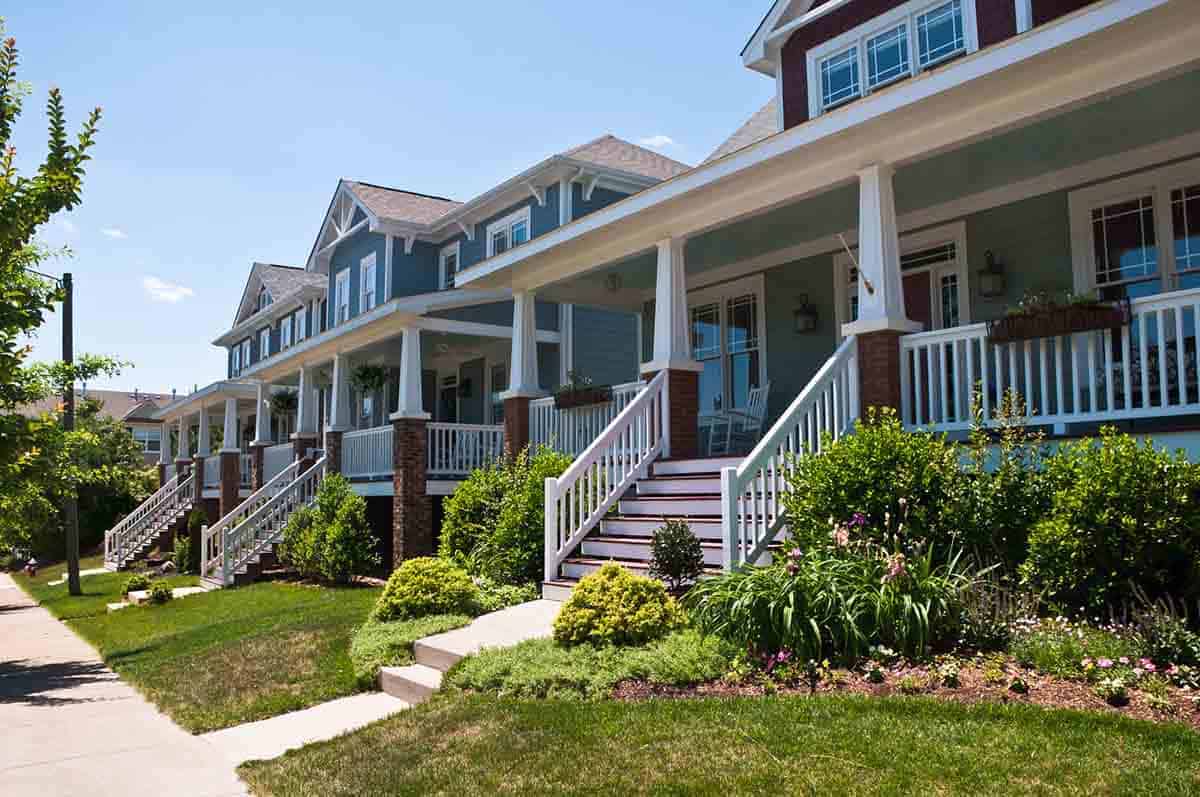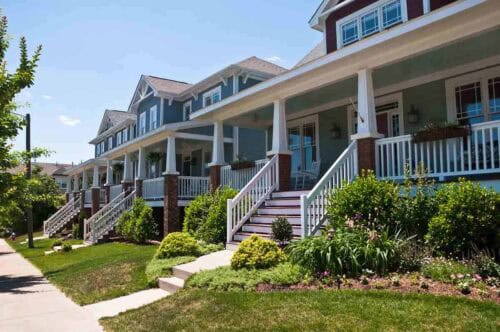
The Raleigh real estate market continues to be one of the most dynamic and opportunity-rich markets in the Southeast. Whether you’re considering a career in real estate or looking to grow your existing business, understanding the nuances of this thriving market is essential for success. Let’s dive into what makes Raleigh’s real estate landscape so compelling in 2025.
Key Takeaways
- Raleigh’s Booming Real Estate Market: The Raleigh-Durham area is experiencing steady growth with median home prices around $451,000, up 6.1% year-over-year, according to July 2025 data from Redfin. The market remains competitive with homes selling in approximately 32 days, creating abundant opportunities for real estate brokers.
- Top Neighborhoods for Real Estate Success: Areas like Wade, Five Points, Mordecai, and Glenwood offer diverse opportunities ranging from affordable investments to luxury properties. Each neighborhood has unique characteristics that appeal to different buyer segments.
- Rental Market Strength: Raleigh’s rental market is robust, with average rents for two-bedroom apartments between $1,750-$1,950 per month, representing a 30% increase over five years. This creates excellent opportunities for investment properties and property management.
- Migration Patterns Favor Growth: Raleigh continues to attract relocators from major metros like Washington, DC, New York, and San Francisco, driving consistent demand for housing across all price points.
- Income Potential for Real Estate Brokers: The average real estate agent salary in Raleigh is $123,019 as of 2025, exceeding the state average of $108,110, making it an attractive career option.
Overview of Raleigh-Durham-Chapel Hill, NC
Raleigh’s appeal extends far beyond its status as North Carolina’s capital. The Triangle region, encompassing Raleigh, Durham, and Chapel Hill, has established itself as a powerhouse for education, technology, and healthcare, creating a stable economic foundation that supports a thriving real estate market.
Key Raleigh Statistics:
- Unemployment Rate: 2.9% (as of December 2024)
- Average Household Income: $112,110
- Cost of Living: 2% lower than the national average
- Population Growth: Continues to be one of the fastest-growing metros in the U.S.
The area’s strong job market, anchored by major universities and Research Triangle Park, brings a steady stream of professionals seeking housing. This combination of economic stability and population growth creates an ideal environment for real estate professionals.
Introduction to the Raleigh Real Estate Market
The Raleigh real estate market in 2025 presents a picture of steady growth and resilience. According to Redfin’s July 2025 data, the median sale price of a home in Raleigh is $451,000, representing a 6.1% increase year-over-year. While this growth is more moderate than the double-digit surges seen in previous years, it indicates a healthy, sustainable market.
Current Market Indicators, according to Redfin:
- Median Sale Price: $451,000 (up 6.1% year-over-year)
- Homes Sold: 524 in July 2025 (up 17.2% from the previous year)
- Median Days on Market: 32 days (compared to 19 days last year)
- Sale-to-List Price Ratio: 98.1% (homes selling close to asking price)
The market is characterized as “somewhat competitive” with homes receiving an average of two offers. While not as frenzied as during the pandemic years, this balanced environment allows both buyers and sellers to make more informed decisions, creating opportunities for real estate professionals to provide valuable guidance.
Rental Market Trends in Raleigh
Raleigh’s rental market continues to show strength in 2025, presenting excellent opportunities for investors and property managers. The average rent for a two-bedroom apartment now ranges between $1,750 and $1,950 per month, representing nearly a 30% increase from five years ago.
- Average Monthly Rent: $1,850 for a two-bedroom apartment
- Annual Rental Expenditure: Approximately $22,200 per year for renters
- Vacancy Rates: Under 4%, indicating strong demand
- Rental Yield: Competitive returns for investors, particularly in East Raleigh and areas near Research Triangle Park
This robust rental market creates opportunities for real estate professionals specializing in investment properties and property management. The growing population of “wealthy renters” – those earning over $185,000 annually who choose to rent for flexibility – represents an emerging market segment worth targeting.
Raleigh Migration and Relocation Trends
Migration patterns are expected to continue favoring Raleigh’s growth in 2026. According to Redfin’s migration analysis from June to August 2025, Raleigh is attracting significant interest from out-of-state buyers, particularly from major metropolitan areas.
Top Inbound Migration Sources, according to Redfin:
- Washington, DC (net inflow of 1,138)
- Fayetteville, NC (net inflow of 1,001)
- New York, NY (net inflow of 758)
- San Francisco, CA (net inflow of 427)
- Kansas City, MO (net inflow of 419)
These migration patterns reflect Raleigh’s appeal as a destination for professionals seeking a high quality of life, strong job market, and relative affordability compared to larger coastal cities. For real estate brokers, understanding the needs and preferences of these relocating buyers can be a valuable specialization.
Top Neighborhoods for Real Estate Brokers in Raleigh
Selecting the right neighborhood to focus your real estate business is crucial for success. Raleigh offers diverse neighborhoods that appeal to different buyer segments and investment strategies.
1. Wade, NC
- Average Home Value: $264,272 (down 1.9% year-over-year)
- Key Opportunities: Affordable investment properties, growing buyer demand, appeal to families and retirees, good location for commuters
2. Five Points, NC
- Average Home Value: $823,498 (up 0.7% year-over-year)
- Key Opportunities: Desirable historic neighborhood, central location, mix of luxury homes, renovated historic properties, and new developments
3. Mordecai, NC
- Average Home Value: $707,291 (down 0.4% year-over-year)
- Key Opportunities: Historic and sought-after neighborhood, specialization in historic home sales and renovations, strong demand, and rising property values
4. Glenwood, NC
- Average Home Value: $1,260,707 (up 0.9% year-over-year)
- Key Opportunities: Prime location near downtown and entertainment districts, appeal to young professionals and luxury buyers, opportunities in high-end condos and rental investments
Additionally, Southeast Raleigh has been identified as one of the best neighborhoods for investment properties in 2025, offering strong appreciation potential and rental demand.
Market Trends and the 2026 Forecast
Looking ahead to 2026, several key trends are shaping the Raleigh real estate market:
Home Price Projections:
- 2025 Median Home Price: $410,700 (up 2% from the previous year)
- 2026 Median Home Price: $420,000 (projected 2% increase)
Sales Volume Forecast:
- 2025 Sales: Existing home sales to rise 9% year-over-year; new home sales to increase by 11%
- 2026 Sales: Existing home sales to rise 13% year-over-year; new home sales to increase by 8%
Mortgage rates are expected to stabilize in the 6.3% range by the end of 2025, with potential for further modest decreases in 2026. This stabilization, combined with increasing inventory, should create a more balanced market that benefits both buyers and sellers.
Amenities and Local Resources to Boost Quality of Life
Raleigh’s appeal extends beyond housing to include numerous amenities that enhance quality of life and influence home values:
- Walkable Neighborhoods: Downtown Raleigh and Five Points top the list for walkability, offering residents easy access to restaurants, shops, and entertainment without relying on cars.
- Parks and Recreation: The city boasts extensive green spaces, including Pullen Park, Umstead State Park, and the Capital Area Greenway System, providing residents with outdoor recreation opportunities.
- Education: Proximity to top-rated schools, including those within the Wake County Public School System, has a significant impact on home values and buyer interest in specific neighborhoods.
- Healthcare: Access to facilities like WakeMed, Duke Health, and UNC Health creates demand in nearby residential areas, particularly among retirees and families.
Real estate professionals who understand how these amenities impact property values can provide more informed guidance to clients and identify promising investment opportunities.
Income Potential and Career Opportunities
For those considering a career in real estate, Raleigh offers attractive income potential. According to data from February 2025, the average salary for real estate agents in Raleigh is $123,019, significantly higher than the North Carolina state average of $108,110.
Income potential varies by neighborhood specialization and niche:
- Luxury market specialists (Glenwood, North Hills) typically earn higher per-transaction commissions
- High-volume agents in mid-market neighborhoods may achieve greater annual income through more transactions
- Investment property specialists can build recurring revenue through property management
The continued growth of Raleigh’s population and housing market suggests sustained demand for real estate professionals, making it an attractive career option for those entering the field or relocating from other markets.
Step-by-Step Guide to Becoming a Real Estate Agent in Raleigh
For those interested in entering the Raleigh real estate market as a professional, here’s a roadmap to success:
-
Complete Pre-Licensing Education: North Carolina requires 75 hours of pre-licensing education from an approved provider, such as Superior School of Real Estate.
-
Pass the North Carolina Real Estate Licensing Exam: The exam consists of both national and state-specific portions.
-
Select a Brokerage: In North Carolina, new agents must work under a broker-in-charge. Research different brokerages to find one that aligns with your career goals and provides appropriate training and support.
-
Build Your Local Network: Connect with local businesses, community leaders, and other professionals to establish a strong presence in Raleigh’s competitive market.
-
Develop Neighborhood Expertise: Focus on becoming an expert in specific Raleigh neighborhoods to differentiate yourself from other agents.
-
Continue Your Education: Complete post-licensing requirements and pursue continuing education to enhance your skills and maintain your license.
FAQs on Raleigh’s Real Estate Market
Q: Is Raleigh a good city to invest in real estate?
A: Yes. Strong job growth, steady population increases, and relatively affordable housing compared to other tech hubs make Raleigh an excellent investment market with both appreciation potential and strong rental demand.
Q: Which neighborhoods have the highest Walk Score in Raleigh?
A: Downtown Raleigh and Five Points top the list for walkability, offering residents easy access to amenities without requiring a car.
Q: What’s the average price per square foot in Raleigh?
A: As of July 2025, the median sale price per square foot in Raleigh is $236, down 2.1% since last year, according to Redfin data.
Q: Is Raleigh still a seller’s market?
A: Raleigh remains somewhat competitive with a Redfin Compete Score of 67 out of 100. While not as strongly tilted toward sellers as in previous years, limited inventory (2.5 months) still gives sellers an advantage in many neighborhoods.
Q: What are the best areas for rental property investments?
A: Southeast Raleigh, areas near Research Triangle Park, and neighborhoods close to major universities offer excellent rental investment opportunities with strong demand and competitive returns.
Comparative Analysis: Raleigh vs Other NC Markets
Raleigh’s real estate market shows distinct characteristics when compared to other North Carolina cities:
Raleigh vs. Durham:
- Raleigh: Median days on market: 32, Somewhat competitive (Redfin score: 67)
- Durham: Median days on market: 34, Somewhat competitive (Redfin score: 64)
Raleigh vs. Cary:
- Raleigh: Median sale price: $451,000 (up 6.1% YoY)
- Cary: Higher prices, quicker sales (median days on market: 27), Very competitive (Redfin score: 76)
Raleigh vs. Charlotte:
- Raleigh offers more tech-focused job opportunities
- Charlotte provides more opportunities in finance and banking sectors
- Both markets show strong growth potential for 2025-2026
Understanding these market differences helps real estate professionals guide clients in making decisions between these neighboring cities.
Tools and Resources for Real Estate Success in Raleigh
Successful real estate professionals leverage various tools and resources to stay informed and serve clients effectively:
Market Data Sources:
- Redfin for comparative market trends and migration data
- Zillow for pricing accuracy and rental market insights
- Local MLS for the most current listing and sales data
Networking Organizations:
- Raleigh Regional Association of REALTORS®
- Triangle Real Estate Investors Association
- Raleigh Chamber of Commerce
Education and Professional Development:
- Superior School of Real Estate for licensing and continuing education
- Real Estate Negotiation Institute for advanced skills
- Institute for Luxury Home Marketing certification for high-end property specialists
Staying current with these resources helps real estate professionals provide more value to clients and identify emerging opportunities in Raleigh’s dynamic market.
Are You Ready to Elevate Your Career in Raleigh’s Flourishing Real Estate Market?
Raleigh’s real estate market offers tremendous opportunities for both new and experienced real estate professionals. With strong population growth, steady price appreciation, and diverse neighborhood options, the market provides a solid foundation for building a successful career.
Whether you’re specializing in luxury properties in North Hills, helping first-time buyers in Wade, or focusing on investment properties in Southeast Raleigh, understanding the unique characteristics of this market will position you for success.
Enroll with Superior School of Real Estate today and take the first step toward a rewarding career in one of America’s most promising real estate markets. Flexible courses and financing options await!
Disclaimer: This report is informed by a blend of trusted perspectives, including insights from seasoned real estate instructors who serve as local experts and professionals deeply embedded in the North Carolina housing market. Complementing their expertise are data and trends drawn from leading real estate publications, comprehensive market analyses, and reputable industry reports. Together, these sources provide a well-rounded depiction of the North Carolina real estate landscape, ensuring that buyers, investors, and professionals alike have access to actionable and reliable information.
Disclaimer: This guide is for general informational purposes only, based on an August 2024 survey of Superior School of Real Estate alumni and publicly available industry sources. While Superior strives for accuracy, we make no guarantees regarding the completeness, reliability, or applicability of the information. Earnings and outcomes vary widely based on factors like location, experience, and market conditions and should not be considered guarantees. This guide does not constitute professional advice. Users should consult additional sources for personalized guidance.






